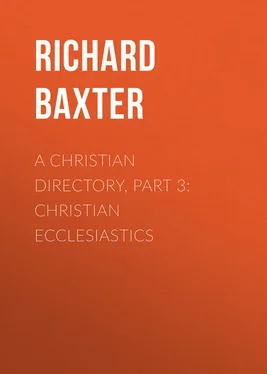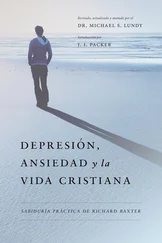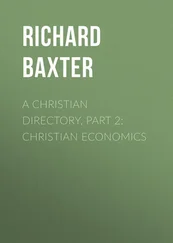Richard Baxter - A Christian Directory, Part 3 - Christian Ecclesiastics
Здесь есть возможность читать онлайн «Richard Baxter - A Christian Directory, Part 3 - Christian Ecclesiastics» — ознакомительный отрывок электронной книги совершенно бесплатно, а после прочтения отрывка купить полную версию. В некоторых случаях можно слушать аудио, скачать через торрент в формате fb2 и присутствует краткое содержание. Жанр: foreign_antique, foreign_prose, на английском языке. Описание произведения, (предисловие) а так же отзывы посетителей доступны на портале библиотеки ЛибКат.
- Название:A Christian Directory, Part 3: Christian Ecclesiastics
- Автор:
- Жанр:
- Год:неизвестен
- ISBN:нет данных
- Рейтинг книги:3 / 5. Голосов: 1
-
Избранное:Добавить в избранное
- Отзывы:
-
Ваша оценка:
- 60
- 1
- 2
- 3
- 4
- 5
A Christian Directory, Part 3: Christian Ecclesiastics: краткое содержание, описание и аннотация
Предлагаем к чтению аннотацию, описание, краткое содержание или предисловие (зависит от того, что написал сам автор книги «A Christian Directory, Part 3: Christian Ecclesiastics»). Если вы не нашли необходимую информацию о книге — напишите в комментариях, мы постараемся отыскать её.
A Christian Directory, Part 3: Christian Ecclesiastics — читать онлайн ознакомительный отрывок
Ниже представлен текст книги, разбитый по страницам. Система сохранения места последней прочитанной страницы, позволяет с удобством читать онлайн бесплатно книгу «A Christian Directory, Part 3: Christian Ecclesiastics», без необходимости каждый раз заново искать на чём Вы остановились. Поставьте закладку, и сможете в любой момент перейти на страницу, на которой закончили чтение.
Интервал:
Закладка:
What commands of God are not universal nor perpetual.
Direct. XII. Observe well in Scripture the difference between Christ's universal laws, (which bind all his subjects in all times and places,) and those that are but local, personal, or alterable laws; lest you think that you are bound to all that ever God bound any others to. The universal laws and unalterable are those which result from the foundation of the universal and unalterable nature of persons and things, and those which God hath supernaturally revealed as suitable constantly to all. The particular, local, or temporary laws are those, which either resulted from a particular or alterable nature of persons and things as mutually related, (as the law of nature bound Adam's sons to marry their sisters, which bindeth others against it,) or those which God supernaturally enacted only for some particular people or person, or for the time. If you should mistake all the Jewish laws for universal laws, (as to persons or duration,) into how many errors would it lead you! So also if you mistake every personal mandate sent by a prophet or apostle to a particular man, as obliging all, you would make a snare of it. Every man is not to abstain from vineyards and wine as the Rechabites were; nor every man to go forth to preach in the garb as Christ sent the twelve and seventy disciples; nor every man to administer or receive the Lord's supper in an upper room of a house, in the evening, with eleven or twelve only, &c.; nor every one to carry Paul's cloak and parchments, nor go up and down on the messages which some were sent on. And here (in precepts about worship) you must know what is the thing primarily intended in the command, and what it is that is but a subservient means; for many laws are universal and immutable as to the matter primarily intended, which are but local and temporary as to the matter subservient and secondarily intended. As the command of saluting one another with a holy kiss, and using love-feasts in their sacred communion, primarily intended the exercising and expressing holy love by such convenient signs as were then in use, and suitable to those times; but that it be done by those particular signs, was subservient, and a local, alterable law; as appeareth, 1. In that it is actually laid down by God's allowance. 2. In that in other places and times the same signs have not the same signification and aptitude to that use at all, and therefore would be no such expression of love; or else have also some ill signification. So it was the first way of baptizing to dip them over-head; which was fit in that hot country, which in colder countries it would not be, as being destructive to health, and more against modesty; therefore it is plain that it was but a local, alterable law. The same is to be said of not eating things strangled, and blood, which was occasioned by the offence of the Jews; and other the like. This is the case in almost all precepts about the external worshipping gestures: the thing that God commandeth universally is a humble, reverent adoration of him by the mind and body. Now the adoration of the mind is still the same; but the bodily expression altereth according to the custom of countries: in most countries kneeling or prostration are the expressions of greatest veneration and submission: in some few countries it is more signified by sitting with the face covered with their hands: in some it is signified best by standing: kneeling is ordinarily most fit, because it is the most common sign of humble reverence; but where it is not so, it is not fit. The same we must say of other gestures, and of habits: the women among the Corinthians were not to go uncovered because of the angels, 1 Cor. xi. 10, and yet in some places, where long hair or covering may have a contrary signification, the case may be contrary. The very fourth commandment, however it was a perpetual law as to the proportion of time, yet was alterable as to the seventh day. Those which I call universal laws, some call moral; but that is no term of distinction, but signifieth the common nature of all laws, which are for the governing of our manners. Some call them natural laws, and the other positive: but the truth is, there are some laws of nature which are universal, and some that are particular, as they are the result of universal or particular nature: and there are some laws of nature that are perpetual, which are the result of an unaltered foundation: and there are some that are temporary, when it is some temporary, alterable thing in nature from whence the duty doth result: so there are some positive laws that are universal or unalterable, (during this world,) and some that are local, particular, or temporary only. 32 32 See the advertisement before my book against Infidelity.
Direct. XIII. Remember that whatever duty you seem obliged to perform, the obligation still supposeth that it is not naturally impossible to you, and therefore you are bound to do it as well as you can: and when other men's force, or your natural disability, hindereth you from doing it as you would, you are not therefore disobliged from doing it at all; but the total omission is worse than the defective performance of it, as the defective performance is worse than the doing of it more perfectly. 33 33 See Mr. Truman's book of Natural and Moral Impotency.
And in such a case the defects which are utterly involuntary are none of yours imputatively at all, but his that hindereth you (unless as some other sin might cause that). As if I were in a country where I could have liberty to read and pray, but not to preach, or to preach only once a month and no more; it is my duty to do so much as I can do, as being much better than nothing, and not to forbear all, because I cannot do all.
Object. But you must forbear no part of your duty? Answ. True: but nothing is my duty which is naturally impossible for me to do. Either I can do it, or I cannot: if I can, I must (supposing it a duty in all other respects); but if I cannot, I am not bound to it.
Object. But it is not suffering that must deter you, for that is a carnal reason: and your suffering may do more good than your preaching. Answ. Suffering is considerable either as a pain to the flesh, or as an irresistible hinderance of the work of the gospel: as it is merely a pain to the flesh, I ought not to be deterred by it from the work of God; but as it forcibly hindereth me from that work, (as by imprisonment, death, cutting out the tongue, &c.) I may lawfully foresee it, and by lawful means avoid it, when it is sincerely for the work of Christ, and not for the saving of the flesh. If Paul foresaw that the preaching of one more sermon at Damascus was like to hinder his preaching any more, because the Jews watched the gates day and night to kill him, it was Paul's duty to be let down by the wall in a basket, and to escape, and preach elsewhere, Acts ix. 25. And when the christians could not safely meet publicly, they met in secret, as John xix. 38; Acts xii. 12, &c. Whether Paul's suffering at Damascus for preaching one more sermon, or his preaching more elsewhere, was to be chosen, the interest of Christ and the gospel must direct him to resolve: that which is best for the church, is to be chosen.
Direct. XIV. Remember that no material duty is formally a duty at all times: that which is a duty in its season, is no duty out of season. Affirmative precepts bind not to all times (except only to habits, or the secret intention of our ultimate end, so far as is sufficient to animate and actuate the means, while we are waking and have the use of reason). Praying and preaching, that are very great duties, may be so unseasonably performed, as to be sins: if forbearing a prayer, or sermon, or sacrament one day or month, be rationally like to procure your help or liberty to do it afterward, when that once or few times doing it were like to hinder you from doing it any more, it would be your duty then to forbear it for that time (unless in some extraordinary case): for even for the life of an ox or an ass, and for mercy to men's bodies, the rest and holy work of a sabbath might be interrupted; much more for the souls of many. Again I warn you, as you must not pretend the interest of the end against a peremptory, absolute command of God, so must you not easily conclude a command to be absolute and peremptory to that which certainly contradicts the end; nor easily take that for a duty, which certainly is no means to that good which is the end of duty, or which is against it. Though yet no seeming aptitude as a means, must make that seem a duty, which the prohibition of God hath made a sin.
Читать дальшеИнтервал:
Закладка:
Похожие книги на «A Christian Directory, Part 3: Christian Ecclesiastics»
Представляем Вашему вниманию похожие книги на «A Christian Directory, Part 3: Christian Ecclesiastics» списком для выбора. Мы отобрали схожую по названию и смыслу литературу в надежде предоставить читателям больше вариантов отыскать новые, интересные, ещё непрочитанные произведения.
Обсуждение, отзывы о книге «A Christian Directory, Part 3: Christian Ecclesiastics» и просто собственные мнения читателей. Оставьте ваши комментарии, напишите, что Вы думаете о произведении, его смысле или главных героях. Укажите что конкретно понравилось, а что нет, и почему Вы так считаете.












